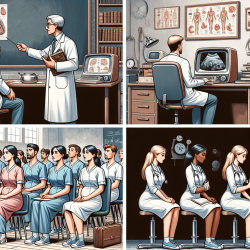Key Findings and Their Implications
1. Importance of Institutional Collaboration
The research highlights the pivotal role of collaboration between educational institutions and healthcare facilities. For instance, the partnership between the Universidade Federal de Minas Gerais Nursing School and Hospital Sofia Feldman was instrumental in advancing obstetric nursing education. Practitioners should advocate for and engage in collaborative efforts to ensure comprehensive training that bridges theoretical knowledge and practical application.2. Addressing Field of Practice Deprivation
One of the significant challenges identified was the deprivation of practical training fields, which hampered the professional development of obstetric nurses. To mitigate such issues, it is crucial to secure diverse and adequate clinical placements. Practitioners should work towards establishing robust networks with healthcare providers to facilitate hands-on training opportunities.3. Evolution of Training Programs
The study documents the evolution of training programs from peripheral initiatives to central, well-structured courses. This progression reflects the necessity for continuous curriculum development to meet emerging healthcare needs. Practitioners can contribute to this evolution by participating in curriculum reviews and providing feedback based on their clinical experiences.4. Navigating Institutional and Legislative Changes
The research underscores the impact of legislative changes on the training and practice of obstetric nurses. Staying informed about policy developments and engaging in advocacy can help practitioners navigate and influence these changes to benefit the profession and patient care.Encouraging Further Research
The genealogical analysis method used in the study offers a unique lens through which to examine the complexities of professional training. Practitioners are encouraged to delve into further research using similar methodologies to uncover additional insights that can inform practice and policy. By contributing to the body of knowledge, practitioners can play a pivotal role in shaping the future of healthcare education.Conclusion
Understanding the historical context of obstetric nurses' training in Minas Gerais provides valuable lessons for contemporary practice. Institutional collaboration, addressing practical training challenges, evolving training programs, and navigating legislative changes are crucial areas that can benefit from these insights. Practitioners are encouraged to engage in further research and advocacy to continue advancing the field.To read the original research paper, please follow this link: The history of obstetric nurses’ professional training in Minas Gerais (1957-1999): a genealogical analysis










